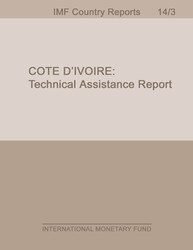
Côte d’Ivoire: Technical Assistance Report
SUMMARY OF KEY FINDINGS AND RECOMMENDATIONSDespite the lack of a suitable legal and regulatory framework, Côte d'Ivoire has madesignificant progress in its preparations for implementing the new budgeting toolsrequired in the WAEMU Harmonized Public Financial Framework. The macroeconomicframework and medium-term fiscal framework efforts began back in 2009, and are beingimplemented normally. Medium-term expenditure frameworks based on program budgets,known as multiyear expenditure programming papers with annual performance projects(DPPD-PAP), are now being prepared in 11 pilot ministries.However, implementing these tools involves heavy and complex reforms that require aprogressive and well-planned approach. The success of these reforms and the effectivenessof the tools in question depend on building them on an effective public financial management(PFM) system that is transparent and efficient through strengthening, at the same time, thefundamentals of PFM that constitute their foundation. In fact, the environment of theperformance-based budgeting approach must be sound and provide a favorable and suitableframework.After taking stock of efforts made in these two fronts, the mission identified theprogress that has already been made, as well as the weaknesses and deficiencies, andproposed necessary reform measures to be implemented by the authorities as part of anaction plan for successful reforms to modernize Côte d'Ivoire's PFM system. Various reformmeasures carried out by different PFM reform units have brought about considerableprogress as follows: (i) the existence of a robust and coherent budgeting procedure; (ii) atimely adoption of the 2013 budget law; (iii) a gradual decline in the use of exceptionalexpenditure execution procedures; (iv) the existence of many information systems (IS) thatcover a large functional area; (v) existence of a cash management system; and (vi) anexperimental exercise, now in progress, for the new budgeting tools.These measures, although they are a step in the right direction, are still insufficient andshould be strengthened given the scope of the reform. The introduction andimplementation of the DPPD-PAP is a major change compared to the current traditionalbudgeting system. It takes time and requires technical reforms, and many tools and measuresmust be implemented in every area of PFM. Priority should be placed initially onstrengthening every component of the PFM system to create and bolster an environment thatis appropriate for program-based budgeting.
Publication date: January 2014
ISBN: 9781475515251
$18.00
Add to Cart by clicking price of the language and format you'd like to purchase
Available Languages and Formats
| English |
Prices in red indicate formats that are not yet available but are forthcoming.
Topics covered in this book
This title contains information about the following subjects.
Click on a subject if you would like to see other titles with the same subjects.
Money and Monetary Policy , International - Economics , Public Policy ,
Also of interest
Summary
Copyright © 2010 - 2026
Powered by:
AIDC



